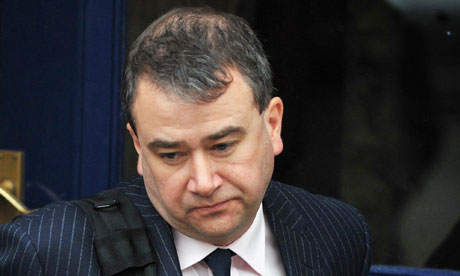-
Thursday 10 February 2011 20.06 GMT
- Article history

A bomb disposal expert was killed at a time when the British army had only half its desired number of specialists qualified to tackle roadside devices, an inquest has heard.
Olaf Schmid, described during the hearing as a "giant of a man", died as he tried to defuse bombs in an alleyway during his last patrol before heading back to the UK on leave.
Giving evidence to the inquest in Truro, Colonel Bob Seddon, formerly Britain's top bomb disposal expert, told how in the month after Schmid's death in October 2009, the army had 50% of its desired level of improvised explosive device (IED) specialists.
Seddon, who tendered his resignation recently after saying that the military needed more specialists and is to leave the army in the spring, also said it was a "constant battle" to keep up with new IEDs developed by the Taliban. The device that killed Schmid had only a low metal content, making it difficult to detect with the equipment the army then had.
The inquest had heard that Schmid, 30, seemed more impatient than normal during the fatal patrol and it emerged that the day before his death his five-year-old stepson Laird had told him it was time for him to come home during a phone call.
But the Cornwall coroner, Emma Carlyon, said that neither Schmid, who was posthumously awarded the George Cross, nor his comrades could have done anything to prevent the blast that killed him. She told Truro Coroner's Court: "It was his last day before rest and recreation and he was apparently keen to get the task done and anxious to clear the area."
Recording a verdict that Schmid was unlawfully killed while on active service, Carlyon added: "There was nothing in the operation which fell below what might have been expected and that could have contributed to his death."
After the hearing a spokesman for General Sir David Richards, the chief of the defence staff, said that since Schmid's death the number of IED specialists had increased and the equipment they used had improved.
He said: "The threat from the insurgents in Afghanistan changes constantly and we have to adapt our tactics and equipment to meet that evolving threat. At the time of Staff Sergeant Schmid's death, low-metal-content IEDs were an emerging threat which we responded to as quickly as possible, by equipping our counter-IED teams with specialist search capabilities.
"Over the past few years, the number of counter-IED teams on the front line in Afghanistan has increased considerably and at present there are sufficient teams to match the current threat."
The armed forces minister, Nick Harvey, added: "The prime minister announced last summer an extra £67m for additional C-IED equipment. This additional funding is enhancing the capability of our courageous C-IED operators."
Schmid's widow, Christina, was profoundly upset by the inquest. "It is a deeply unsettling and traumatic process for myself, our families, friends and, of course, those members of his team. I will take the next few days to consider its findings in full," she said in a statement.
The Royal British Legion, which supported her, said the case highlighted the need to enshrine in law the military covenant, Britain's codified duty of care to its armed forces.
The Legion's director general, Chris Simpkins, said: "The unquestioning duty of heroes like Staff Sergeant Schmid GC and the bravery of his widow Christina cannot simply be looked after by an unwritten covenant between the state and its armed forces, especially at a time of public service cuts."

No comments:
Post a Comment